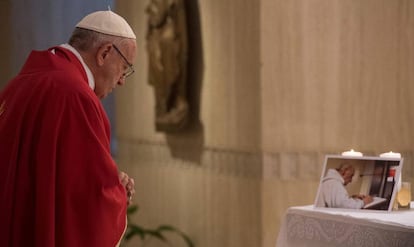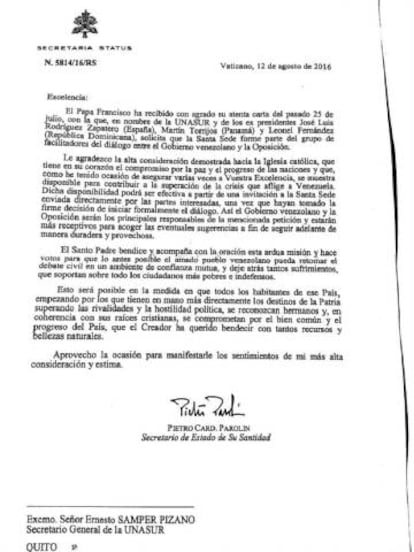Vatican accepts mediation role in Venezuela crisis talks
The Venezuelan government must now formally request the participation of the Holy See in the conflict

The final shape of round-table talks between the government of Venezuela and opposition forces, designed to end the political crisis in the country, is slowly becoming clear.
The Vatican confirmed in a letter sent in August it was prepared to help facilitate dialogue between Venezuela’s ruling party and forces opposed to the presidency of Nicolás Maduro.
Maduro has confirmed receipt of a letter outlining the Holy See’s offer but has not stated whether his government will make a formal petition requesting Vatican involvement.
If Vatican representatives do join talks, they will sit alongside facilitators including former Spanish PM José Luis Rodríguez Zapatero
If Vatican representatives do indeed join the talks, they will sit alongside facilitators including former Spanish Prime Minister José Luis Rodríguez Zapatero, the former president of Panama, Martín Torrijos, and Leonel Fernández, the ex-president of the Dominican Republic.
And while Maduro has not yet officially replied to the Vatican, the head of the Democratic Unity Roundtable (MUD) coalition opposition forces, Jesús Torrealba, confirmed on Wednesday that the group will do so.
“The [Vatican’s] letter arrives at a time when authorities are trying to tarnish the image of the opposition. We are prepared to talk with anyone as long as the time frames for a referendum on a change of president in Venezuela are respected,” Torrealba said.

Venezuela’s opposition forces have said they will continue to protest on the streets until they have a date for the collection of the signatures of 20% of registered voters – a necessary condition for the calling of a recall referendum on the presidency.
Those signatures must be collected within three days for the referendum to get the go-ahead.
If that referendum takes place on or before January 10, 2017, and Maduro loses the vote, new elections will be held. If, however, the referendum is held after that date and pro-MUD forces win the vote, Maduro will be simply replaced by current Vice President Aristóbulo Istúriz, who will remain in power until new general elections in 2019.
Maduro’s popularity continues to wane on the back of the country’s economic crisis and the latest arrests of political opponents. Shortages of food and medical supplies are also taking their toll while the national electoral commission – controlled by the ruling party – has come under fire for hampering efforts to see the referendum on the presidency held this year.
Caracas Mayor Jorge Rodríguez, charged with verifying signatures collected by opposition forces, has accused MUD of committing fraud in the process, while anti-government figures have filed numerous complaints against the electoral commission.
Maduro’s popularity continues to wane on the back of the country’s economic crisis
Forces opposed to Maduro are planning a protest on Friday, calling on the government to declare it the first day of the three-day period for collecting signatures needed for the holding of a vote on the presidency.
Venezuela’s political crisis is starting to take its toll internationally. On Tuesday, fellow members of the Mercosur trading bloc said the country would not be allowed to take over the group’s rotating presidency.
Venezuela was also at risk of being kicked out of the bloc if it does not meet membership requirements within three months, the new president of Brazil Michel Temer said in a statement signed by fellow bloc founders Argentina, Uruguay and Paraguay.
English version by George Mills.
Tu suscripción se está usando en otro dispositivo
¿Quieres añadir otro usuario a tu suscripción?
Si continúas leyendo en este dispositivo, no se podrá leer en el otro.
FlechaTu suscripción se está usando en otro dispositivo y solo puedes acceder a EL PAÍS desde un dispositivo a la vez.
Si quieres compartir tu cuenta, cambia tu suscripción a la modalidad Premium, así podrás añadir otro usuario. Cada uno accederá con su propia cuenta de email, lo que os permitirá personalizar vuestra experiencia en EL PAÍS.
¿Tienes una suscripción de empresa? Accede aquí para contratar más cuentas.
En el caso de no saber quién está usando tu cuenta, te recomendamos cambiar tu contraseña aquí.
Si decides continuar compartiendo tu cuenta, este mensaje se mostrará en tu dispositivo y en el de la otra persona que está usando tu cuenta de forma indefinida, afectando a tu experiencia de lectura. Puedes consultar aquí los términos y condiciones de la suscripción digital.









































